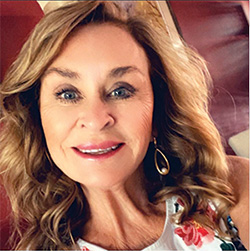
On the back of Lisa Szafaryn Garcia’s car, raised silver lettering proclaims, “Female Veteran: Special Edition.” It took more than four decades for Garcia to make such a proud and public declaration.
She enlisted in the Army in 1978 as an X-ray technician. Her father had recently died from a heart attack, and Garcia, devastated by the loss, was looking to get away. It was more than that, though. She saw being an X-ray tech as an honorable career path to pursue.
But Garcia’s military service and career were derailed when someone entered her barracks room in the middle of the night and sexually assaulted her.
“It went from light to dark,” Garcia said of that time period.
In July 2023, almost 44 years to the day of the assault, light crept back in. With the help of a DAV benefits advocate, Garcia was finally granted service connection for post-traumatic stress disorder (PTSD) related to military sexual trauma (MST).
“Any time I can call a veteran and tell them that they’ve succeeded in their goals, it’s an amazing feeling,” said Jackie Graham, assistant supervisor for DAV’s national service office in Montgomery, Alabama, and the advocate on Garcia’s case. “It makes everything you do all day, every day, worth it when you can finally get them to that point where they feel justified.
“They’re getting what they’ve earned.”
‘DAV IS YOUR FLOATY’
After the assault, Garcia’s request to transfer to a different unit where she would feel safer was denied. And despite immediately reporting the assault, she wasn’t offered any mental health care or accommodation. Her attacker was never identified.
Desperate to get out of the military, Garcia stopped participating in morning formation and regularly reported to sick call. Ultimately, her concern for her personal safety and the betrayal she suffered led her to go AWOL. What she didn’t realize at the time was that she would receive an other-than-honorable discharge, disqualifying her from Department of Veterans Affairs benefits.
What followed were decades of turmoil. Garcia struggled with symptoms of PTSD, panic attacks and blackouts. She had difficulty trusting people and constantly felt on guard. On top of that, she had to navigate the frequent moves and changes that came with her husband being on active duty. And she definitely didn’t proclaim her veteran status proudly.
In January 2019, Garcia received a letter from the VA notifying her that other-than-honorable discharges related to MST or PTSD could be eligible for upgrades. The process, which she tackled on her own, took roughly two years.

Meanwhile, Garcia read a story in DAV Magazine that gave her hope. The story featured Army veteran and MST survivor Migdalia Griswold. Like Garcia, Griswold was given an other-than-honorable discharge after an assault and was left to deal with the fallout of trauma on her own. DAV ultimately helped Griswold get her discharge status upgraded so she could access the benefits she earned.
Garcia reached out to DAV, and ultimately, Graham assisted with her case. It was up to her to help Garcia prove that her PTSD was related to MST so that she could receive the benefits she earned.
Graham delivered the good news to Garcia in July 2023. Garcia looks forward to the day when she no longer has to keep a bag full of paperwork related to her claim. In the meantime, she wants to share her story in hopes of encouraging other veterans and MST survivors to seek the benefits they earned—like Griswold’s story did for her.
“Don’t give up,” she said.
Graham encourages veterans to reach out to DAV before pursuing a discharge upgrade or benefits claim on their own. Doing so can help streamline and expedite the process.
“[When you leave service], they tell you that the VA has a swimming pool … and then they push you in and walk away. They don’t teach you how to swim,” Graham said. “Your DAV benefits advocates, they teach you how to swim.
“Your DAV benefits advocate is your floaty.”
Find contact info for the DAV benefits advocate nearest you at benefitsquestions.org.






